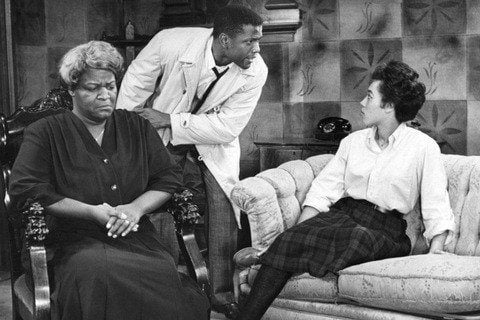
It’s as if the play’s trying to burst its seams, to break beyond its Broadway-friendly naturalism. It’s to them he wants to prove himself, and when Wynter’s Lena scolds him, you see the boy beneath the man.Įvery so often, Walton nudges into expressionism, filling the flat with orange light. Zhangazha’s Walter always has his family’s interests at heart. When Walter returns to romance his wife, Susan Wokoma‘s Beneatha smiles as she screws up her face. Walton’s cast have the easy intimacy of people that know each other’s bathroom routines. You see it in the hands on deck needed to keep everything shipshape: the ironing, the arguing, the cockroach extermination. You hear it in the way the family talk: both Beneatha’s posh, white ‘hairlo’ down the phone and Walter’s clipped service speak – yessir, nosir – deny their own natural dialects. Mike Burnside’s squirming Karl Linder is all respectful civility, but betrays himself bit by bit: the way he swallows "you people," the way he claims to want dialogue, then gabbles non-stop.Ī touch stagey, with blocking you notice, Walton’s production nonetheless has a keen sense of daily battles and frustrations. It understands that discrimination smiles as it shuts the door closed. Before she can define her dreams, Beneatha has to define herself – how African and how American.ĭawn Walton‘s production never demonises white America, but flags systemic issues. Ruth ends up trapped indoors – a whole four years before Betty Friedan. Walter’s lack of self-worth makes him testy at home. Hansberry shows, brilliantly, how struggles stack up and multiply. Though the play’s defining moment is that neighbourhood’s response – they send a ‘welcoming committee’ to buy the family out – it never reduces the uphill struggle of African Americans to a single instance. An insurance of $10,000 makes a lot possible, but their mother Lena (Angela Wynter) opts to put a down payment on a house in a well-to-do white neighbourhood, Clybourne Park. Beneatha, Walter’s sister, dreams of becoming a doctor. Walter Lee Junior ( Ashley Zhangazha), a chauffeur, wants his own business his wife Ruth wants her own home.


Squished into their two-bed "rat-trap" in Chicago, the Younger family want what every American family wants: to get on in life. In a single swoop, A Raisin in the Sun changed the colour of the great American play.Īlmost 60 years on, it’s still rich and the struggles it shows so eloquently, of African Americans locked out of white America, caught between assimilation and exile, are still raw – both a testimony to Hansberry and an indictment of America. Lorraine Hansberry‘s classic rolls an inheritance drama, an American dream play, feminist argument and a family portrait into one, and then turns the lot over to the consideration of race.


 0 kommentar(er)
0 kommentar(er)
